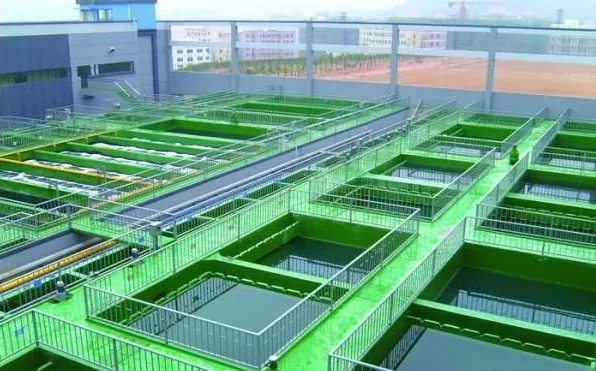In the treatment of difficult industrial wastewater — such as coking effluent, dye wastewater, phenol-containing chemical effluent, and high-strength pesticide wastewater—traditional biological processes often fall short.
The Fenton reaction, a classic advanced oxidation process (AOP), is now widely used in pretreatment stages, significantly improving the biodegradability of complex wastewater.
🔬 How the Fenton Reaction Works
The Fenton process relies on a catalytic reaction between ferrous ions (Fe²⁺) and hydrogen peroxide (H₂O₂) under acidic conditions, producing highly reactive hydroxyl radicals (•OH).
These radicals:
- Rapidly break down long-chain organic molecules
- Destroy aromatic structures
- Convert complex compounds into smaller, biodegradable intermediates
This makes Fenton a highly effective tool for degrading persistent organic pollutants before biological treatment.

🧪 Typical Fenton Treatment Process
- Pretreatment Use screens, oil separators, and grit chambers to remove large particles and suspended solids.
- pH Adjustment Lower pH to 2–4 using sulfuric acid. 👉 Optimal range: pH ≈ 3.5
- Catalyst Addition Add ferrous sulfate heptahydrate (FeSO₄·7H₂O) to activate the reaction.
- Hydrogen Peroxide Dosing Add H₂O₂ to generate hydroxyl radicals for rapid oxidation.
- pH Neutralization After reaction, adjust pH back to neutral using caustic soda or lime.
- Coagulation & Sedimentation Add coagulants like PAC and PAM to separate solids from treated water.
⚙️ Key Factors Affecting Fenton Efficiency
- pH control: Critical for •OH production—avoid too high or too low levels
- Catalyst dosage: Too little = underperformance; too much = color/mud issues
- H₂O₂ dosage: Balance is key—excess leads to waste or floating sludge
- Reaction time: 1.5–2 hours is ideal for complete degradation
- Temperature: Higher temps can speed up reactions, but be cautious with heat-sensitive systems
🏭 Application Scenarios & Recommendations
Fenton oxidation is widely used in coking, pesticide, and petrochemical wastewater due to its:
- High reaction efficiency
- Broad applicability
- Flexible operation
However, its success depends on precise control of reaction conditions. ⚠️ System design should be tailored to the specific wastewater characteristics.
✅ Final Advice
Fenton reaction isn’t just chemistry—it’s an engineering solution. If you need help with:
- Chemical dosing optimization
- Reactor design
- System integration for Fenton pretreatment
💬 Drop your questions in the comments or contact us for expert support.
